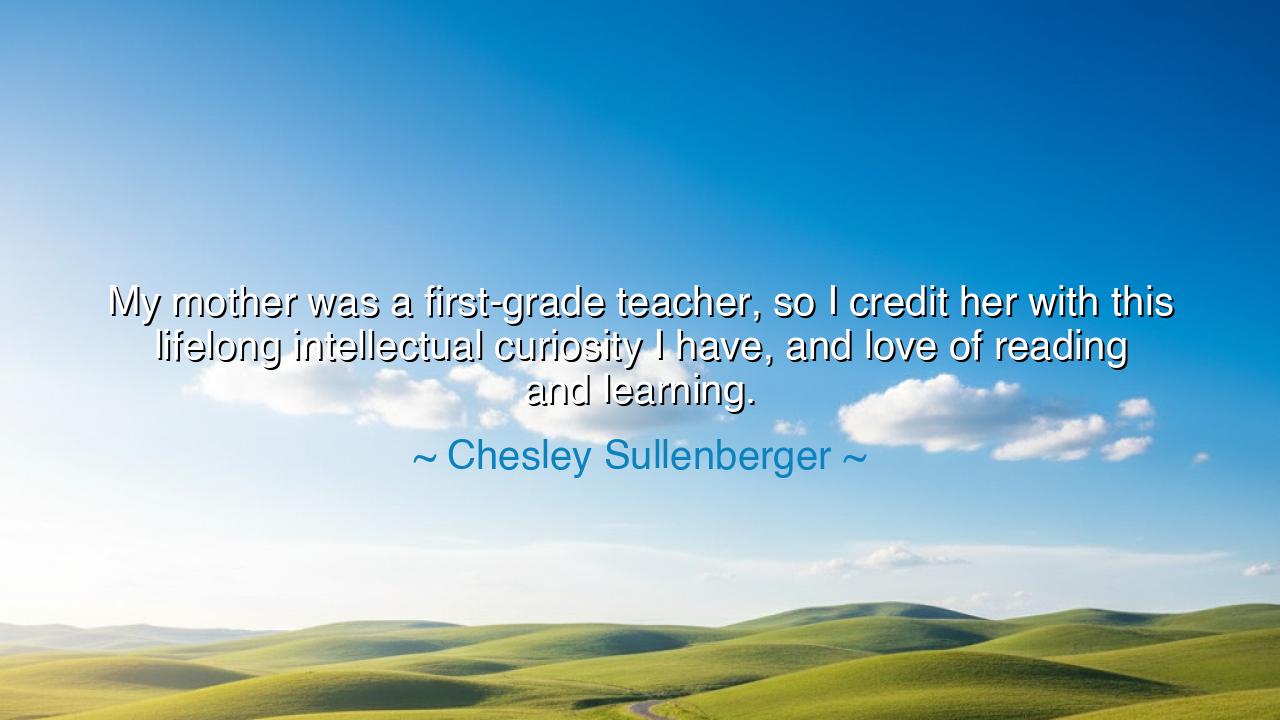
My mother was a first-grade teacher, so I credit her with this
My mother was a first-grade teacher, so I credit her with this lifelong intellectual curiosity I have, and love of reading and learning.






The words of Chesley Sullenberger—“My mother was a first-grade teacher, so I credit her with this lifelong intellectual curiosity I have, and love of reading and learning”—speak to the sacred power of a parent’s influence, and to the eternal flame kindled by the guidance of a teacher. They remind us that knowledge is not an accident, nor curiosity a random spark; these are cultivated in the heart by those who love us enough to teach us, to place in our hands the tools of wisdom, and to awaken our minds to the wonder of the world. Sullenberger’s tribute is not only to his mother, but to all who labor in classrooms and homes, planting seeds whose fruits may not be seen until decades later.
The origin of this truth lies in the earliest bond between child and teacher. For what is a first-grade classroom if not the threshold between innocence and awakening? Here, letters first form into words, numbers begin to reveal their patterns, and the young spirit begins to recognize the infinite possibilities of thought. To have a mother as that teacher is to be doubly blessed: the lessons of the classroom reinforced by the lessons of love, so that learning is not merely duty but joy, not merely memory but passion. Sullenberger reminds us that his curiosity—the fuel of all discovery—was born not from compulsion, but from encouragement.
History gives us many such examples. Consider Thomas Edison, who as a child struggled in school and was deemed “difficult” by his teachers. It was his mother who withdrew him and taught him at home, instilling in him a love of reading and experimentation. Edison would later say that his mother’s belief in him was the making of him. Just as Sullenberger credits his mother for the foundation of his learning, so too did Edison acknowledge that greatness begins in the encouragement of a parent or teacher who sees the child not as a problem, but as a promise.
The emotional force of Sullenberger’s words becomes even greater when we remember his own life. He is remembered across the world as the pilot who landed Flight 1549 safely on the Hudson River, saving the lives of all aboard. In that moment of crisis, when calm judgment and clear thinking were required, it was not simply training but also intellectual discipline and curiosity that steadied him. The lifelong habits of attention, learning, and critical thought—nurtured by a first-grade teacher who was also his mother—prepared him for the hour of greatest trial. What began with reading and curiosity ended with courage and competence.
There is something deeply heroic in this teaching. For it proclaims that greatness is not forged only in dramatic moments, but in the quiet, unseen labor of mothers and teachers. A mother’s influence, expressed in patient teaching and love of learning, can echo across decades, shaping not only the mind of a child but the destiny of hundreds who will one day depend upon him. The heroism of Sullenberger on the Hudson was the flowering of seeds planted in a childhood classroom by a woman who understood the sacred duty of teaching.
The lesson for us is clear: never underestimate the power of early education, nor the influence of parents who nurture learning. Curiosity is not given once for all—it must be modeled, encouraged, and fed. A child who learns to love books, to wonder at the mysteries of life, and to ask questions with boldness is a child prepared not only for success, but for wisdom. And those who guide such children wield a power greater than armies or kings: they shape the minds and hearts of the future.
What, then, shall we do? Let us honor the teachers who awaken curiosity in our children. Let us cherish the parents who read aloud, who answer questions patiently, who encourage exploration rather than stifle it. Let us ourselves strive to model intellectual curiosity, not only in words but in action, showing that learning is not a chore but a lifelong adventure. And let us remember, when we face our own moments of crisis, that the habits of calm thought and disciplined attention are fruits of seeds sown long ago.
Thus, Sullenberger’s words stand as a tribute and a teaching: a first-grade teacher, who was also a mother, gave him the gift of curiosity, and with it, the strength to meet life’s greatest tests. This is the legacy of teachers and parents alike—that the small lessons of childhood may one day become the strength that saves lives, inspires generations, and proves that love and learning together form the foundation of greatness.






AAdministratorAdministrator
Welcome, honored guests. Please leave a comment, we will respond soon